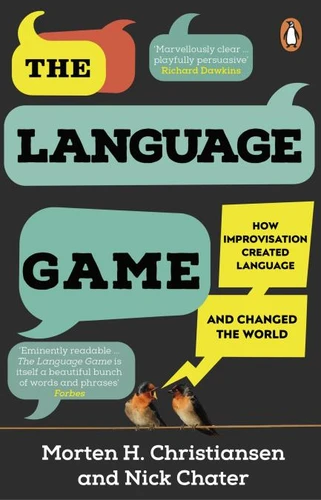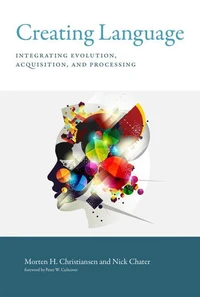The Language Game. How improvisation created language and changed the world
Par : ,Formats :
Disponible dans votre compte client Decitre ou Furet du Nord dès validation de votre commande. Le format ePub protégé est :
- Compatible avec une lecture sur My Vivlio (smartphone, tablette, ordinateur)
- Compatible avec une lecture sur liseuses Vivlio
- Pour les liseuses autres que Vivlio, vous devez utiliser le logiciel Adobe Digital Edition. Non compatible avec la lecture sur les liseuses Kindle, Remarkable et Sony
- Non compatible avec un achat hors France métropolitaine
 , qui est-ce ?
, qui est-ce ?Notre partenaire de plateforme de lecture numérique où vous retrouverez l'ensemble de vos ebooks gratuitement
Pour en savoir plus sur nos ebooks, consultez notre aide en ligne ici
- Nombre de pages368
- FormatePub
- ISBN978-1-4735-7841-8
- EAN9781473578418
- Date de parution14/04/2022
- Protection num.Adobe DRM
- Infos supplémentairesepub
- ÉditeurTransworld Digital
Résumé
'Marvellously clear... playfully persuasive' Richard Dawkins'Full of Fascinating details. A delight to read.' Tim Harford'Highly original and convincing ... a delight to read!' - Daniel Everett................................................................................................................................ What is language?Why do we have it?Why does that matter?Language is perhaps humanity's most astonishing accomplishment and one that remains poorly understood.
Upending centuries of scholarship (including, most recently, Chomsky and Pinker) The Language Game shows how people learn to talk not by acquiring fixed meanings and rules, but by picking up, reusing, and recombining countless linguistic fragments in novel ways. Drawing on entertaining and persuasive examples from across the world the book explains:· How our short-lived memory copes with the on-rushing deluge of sound that is everyday speech.· Why it is that language is such a challenge for language scientists but learnt effortlessly by toddlers.· Why the languages of the world are so spectacularly varied---and why no two people speak quite the same language.· Why humans have language, but chimps don't.· How language gave us a big brain and changed the course of evolution.· How language doesn't limit, but does shape, how we think.·And ultimately, why all we know about language should give us hope.
Christiansen and Chater's The Language Game draws on a fascinating range of examples to show the way language works, has shaped our evolution and is critical to our future.
Upending centuries of scholarship (including, most recently, Chomsky and Pinker) The Language Game shows how people learn to talk not by acquiring fixed meanings and rules, but by picking up, reusing, and recombining countless linguistic fragments in novel ways. Drawing on entertaining and persuasive examples from across the world the book explains:· How our short-lived memory copes with the on-rushing deluge of sound that is everyday speech.· Why it is that language is such a challenge for language scientists but learnt effortlessly by toddlers.· Why the languages of the world are so spectacularly varied---and why no two people speak quite the same language.· Why humans have language, but chimps don't.· How language gave us a big brain and changed the course of evolution.· How language doesn't limit, but does shape, how we think.·And ultimately, why all we know about language should give us hope.
Christiansen and Chater's The Language Game draws on a fascinating range of examples to show the way language works, has shaped our evolution and is critical to our future.
'Marvellously clear... playfully persuasive' Richard Dawkins'Full of Fascinating details. A delight to read.' Tim Harford'Highly original and convincing ... a delight to read!' - Daniel Everett................................................................................................................................ What is language?Why do we have it?Why does that matter?Language is perhaps humanity's most astonishing accomplishment and one that remains poorly understood.
Upending centuries of scholarship (including, most recently, Chomsky and Pinker) The Language Game shows how people learn to talk not by acquiring fixed meanings and rules, but by picking up, reusing, and recombining countless linguistic fragments in novel ways. Drawing on entertaining and persuasive examples from across the world the book explains:· How our short-lived memory copes with the on-rushing deluge of sound that is everyday speech.· Why it is that language is such a challenge for language scientists but learnt effortlessly by toddlers.· Why the languages of the world are so spectacularly varied---and why no two people speak quite the same language.· Why humans have language, but chimps don't.· How language gave us a big brain and changed the course of evolution.· How language doesn't limit, but does shape, how we think.·And ultimately, why all we know about language should give us hope.
Christiansen and Chater's The Language Game draws on a fascinating range of examples to show the way language works, has shaped our evolution and is critical to our future.
Upending centuries of scholarship (including, most recently, Chomsky and Pinker) The Language Game shows how people learn to talk not by acquiring fixed meanings and rules, but by picking up, reusing, and recombining countless linguistic fragments in novel ways. Drawing on entertaining and persuasive examples from across the world the book explains:· How our short-lived memory copes with the on-rushing deluge of sound that is everyday speech.· Why it is that language is such a challenge for language scientists but learnt effortlessly by toddlers.· Why the languages of the world are so spectacularly varied---and why no two people speak quite the same language.· Why humans have language, but chimps don't.· How language gave us a big brain and changed the course of evolution.· How language doesn't limit, but does shape, how we think.·And ultimately, why all we know about language should give us hope.
Christiansen and Chater's The Language Game draws on a fascinating range of examples to show the way language works, has shaped our evolution and is critical to our future.




